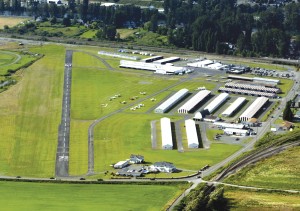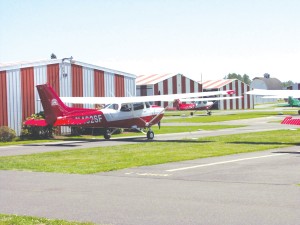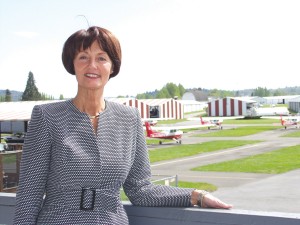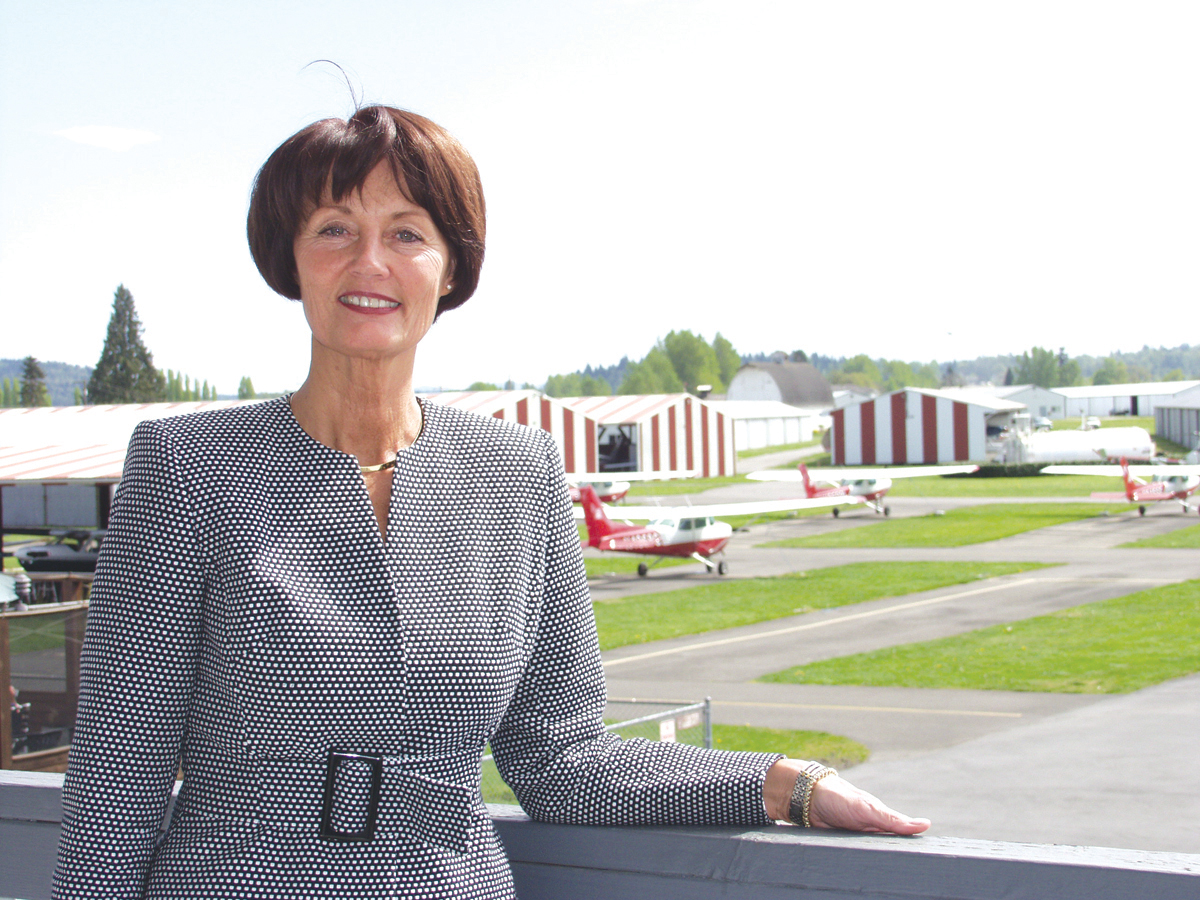By Terry Stephens,
Kandace Harvey, the operator of family-owned Harvey Field in Snohomish, Wash., is an enthusiastic promoter of aviation. She’s also a role model for women pilots and a determined protector of one of the state’s busiest general aviation airfields.

Harvey Field was built in 1944 on half of the Harvey family’s 160-acre homestead, established in 1859. Today, the airport is home to the fourth, fifth and sixth generations of Harveys.
Harvey Field occupies half of the 160-acre homestead settled in 1859 by John and Christina Harvey. Kandace Harvey is part of the fourth generation of Harveys at the airport.
“Our family lives either on the airport’s 76 acres or on adjacent homestead land,” Harvey said. “That’s been a blessing to me. My kids—Lance, Heather, Tyson and Preston—are the fifth generation. My grandchildren—Bailey, Paige, Lilly and Lukas—are sixth-generation Harveys. It’s my hope that many more generations of the family will continue to live, raise their families, work and pursue their dreams on the homestead land.”
Aviation history is as much a part of the Harvey homestead today as family history. The first hot air balloon floated aloft from the old “Harvey Ball Park” on the property in the early 1900s, followed by the first aircraft flight from the same spot in 1911. By 1944, the Harvey family airfield was becoming a reality. Built by John Harvey’s son Noble and his son Eldon, the privately owned airport opened in 1945 for public flights.
In 1944, there were hangars, a flight center and an east-west runway, rather than today’s north-south strip. In 1947, the airfield added a restaurant, administration building and a flight school. Eldon and Marjorie Harvey and their three children ran the airfield, restaurant and flight school until the early 1970s, when Richard and Kandace Harvey assumed management of airfield operations.
By 1998, Harvey Field saw 140,700 flight operations annually. That year, a Federal Aviation Administration study ranked the airport as the fifth busiest of 10 regional Washington airports, following Seattle-Tacoma International Airport with 407,500 operations, King County International Airport/Boeing Field with 345,100 operations, Snohomish County Airport/Paine Field with 192,000 operations, and Auburn Municipal Airport with 172,000 takeoffs and landings.
The airport is one of the region’s most active and colorful aviation venues. Harvey Field boasts more than 330 aircraft, including six helicopters and eight multi-engine planes; a hot air balloon business; one of the state’s most active flight schools; flights for scenic and photo tours over Mt. Rainer, Mt. Baker and the nearby Cascade Mountains; plus a sky-diving school that’s home to America’s oldest parachute club.
Overall, a 2001 study by the Washington State Department of Transportation’s Aviation Division credited Harvey Field for providing nearly 450 jobs, more than $7.5 million in annual payrolls and an economic impact on the local community of more than $22.2 million each year. Nearly two dozen commercial businesses operate on the airfield, including the Buzz Inn restaurant, Airport Welding and Muffler, Northwest Aero Tours, Orion Technologies, Superior Machine and Manufacturing, and the Airial Balloon Co., run by Harvey’s sister-in-law, Marilyn Harvey, which conducts more than 1,400 aerial excursions a year over the Snohomish River Valley.
Richard Harvey

Part of the fleet operated by Snohomish Flying Service at Harvey Field for flight training. The airport also offers an aerial balloon business and sky-diving center, helicopter instruction and some two dozen commercial businesses.
Harvey gives her late husband much of the credit for what the airfield is today.
“During the 28 years we were married, until he lost his fight with leukemia in 1995, it was Richard’s personal mission to create an environment at Harvey Field that was professional, yet enjoyable and comfortable,” she said. “His warm smile and easy-going personality were contagious. He always made everyone feel welcome.”
Rated as a commercial pilot and an airframe and power plant mechanic, Richard Harvey spent countless hours in the cockpit of his Cessna 185 floatplane. He often flew to the San Juan Islands for sightseeing and recreation trips and to Canada and Alaska for fishing and hunting adventures.
“He never thought of his work in aviation as a job,” Harvey said. “He considered it a privilege and enjoyed every moment.”
The fifth generation
Harvey’s children, who are co-owners of the airfield with their mother, operate four of the businesses at Harvey Field.
Her daughter, Heather Waldow, and her husband, Andrew, run Snohomish Flying Service, which offers flight training for everything from single-engine sport pilot licenses to multi-engine commercial pilot and helicopter ratings, as well as air charters and scenic and photo tours.
Presently there are 165 students enrolled in flying programs at Harvey Field. In the past 12 months, 55 students graduated; during that same period, another 87 signed up. That’s a clear sign of the growing interest in aviation generated by the Harveys.
Tyson Harvey owns Skydive Snohomish, a business that has made Harvey Field one of the best known skydiving centers in the state. With 14,500 jumps annually, it’s also home to the Seattle Skydivers, the oldest parachute club in the nation.
Preston Harvey manages the airfield’s maintenance and flight line operations, while Lance Harvey operates Lance Harvey Trucking & Excavating Inc.
Kandace Harvey

CEO Kandace Harvey runs family-owned Harvey Field in Snohomish, Wash. The private airport is one of the state’s most active general aviation fields.
Kandace Harvey remarried a few years after her husband’s death. A commercial and ATP pilot, as well as an A&P mechanic, Phil Stiffler had spent most of his life in aviation, flying a variety of cargo aircraft in Alaska.
“After we were married, he’d often remind me that he was retired and spending his winters playing golf in Arizona when we met,” she said. “Now he’s working fulltime again helping to manage the airport.”
Harvey Field has seen increased flight school activity thanks to the Be A Pilot Program, which offers discounted “discovery” flights and instruction classes for people wanting to “try out” flying before getting serious about it. The other big boost lately has been the new sport pilot license recently approved by the FAA. Harvey has been so busy with that program that she plans to get a second sport pilot-rated aircraft for instruction.
Running a busy, growing airport also has its challenges in being a good neighbor and protecting the airport’s options for future development. In its rural setting, rerouting aircraft operations away from sensitive residential areas at the north end of the main runway and scattered residences near the southern end mediate most of Harvey Field’s noise issues.
Harvey recently fended off a rezoning of the airfield’s adjacent properties that would’ve affected more than half of the airport’s land and stopped any future expansion. Her efforts were assisted by support from the local chapter of the Aircraft Owners and Pilots Association, which also stepped up to oppose a rezoning effort in 1999.
“I face three major challenges: land use and zoning issues, as the area grows around us; operating an airport and industrial park in a flood plain; and aircraft noise,” Harvey said. “We don’t have a lot of difficulty with the sparsely settled rural residential area around us, but at the north end of our runway, the city of Snohomish is close by, just over the Snohomish River. We do get noise complaints from residents of two blocks of homes there. If zoning will let us continue to grow, we want to extend our runway by 1,000 feet. That will put aircraft taking off to the north at least another 500 to 700 feet higher. People in town would hardly notice it anymore.”
Because the airport’s activity is growing, its new master plan anticipates the airfield will have 396 aircraft by 2025, with 214,500 operations projected. That’s one reason Harvey wants to pave the grass airstrip and then use the existing 2,660-foot-long paved runway as a parallel taxiway. She also plans to build more hangars, a larger flight school facility, a new aircraft maintenance facility and additional parking on the west side of the airfield.
All of the work gets balanced with fun, too. Each August, for 53 years, Harvey Field has provided the community with an aviation open house. This year’s event on Aug. 26 will again feature a corn roast and fly-in, hot dog and ice cream stands, tours of the airport’s facilities and biplane and helicopter flights.
The family-owned airfield will also sponsor the 11th annual Dick Harvey Memorial Golf Tournament July 29 at Legion Golf Course in Everett to raise funds for the Snohomish Senior Center, food bank, youth center and soup kitchen.
Encouraging women to fly
One of Harvey’s prime efforts in aviation today is encouraging more women to learn to fly. She promotes that message in her advertising in local publications, in brochures and on posters, and face-to-face whenever she has an opportunity.
“My enthusiasm for promoting and supporting women pursuing careers and recreational interests in aviation is a result of my own life experience,” Harvey said. “I want to help other women enjoy the flying opportunities I’ve been so fortunate to experience. I don’t fly for a living, but I’m a licensed pilot and use the experience of my training on a daily basis in the ownership and management of the airport.”
Harvey said opportunities to pursue rewarding and challenging aviation careers, as well as recreational flying, are equally open to women.
“However, women aren’t targeted in the same way that men are, so often I hear women say they just never really thought about it,” she said. “One of my primary goals is to educate and encourage more women to consider aviation, not only as a career or flying for enjoyment but also for self-esteem as a valuable professional credential.”
For more information on Harvey Field, visit [http://www.harveyfield.com], or call 360-568-6894.











